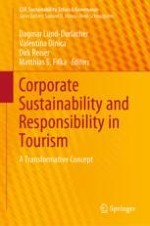
2019 | OriginalPaper | Buchkapitel
1. Challenges for Tourism—Transitioning to Corporate Sustainability and Responsibility
verfasst von : Valentina Dinica, Dagmar Lund-Durlacher, Dirk Reiser
Erschienen in: Corporate Sustainability and Responsibility in Tourism
Aktivieren Sie unsere intelligente Suche, um passende Fachinhalte oder Patente zu finden.
Wählen Sie Textabschnitte aus um mit Künstlicher Intelligenz passenden Patente zu finden. powered by
Markieren Sie Textabschnitte, um KI-gestützt weitere passende Inhalte zu finden. powered by